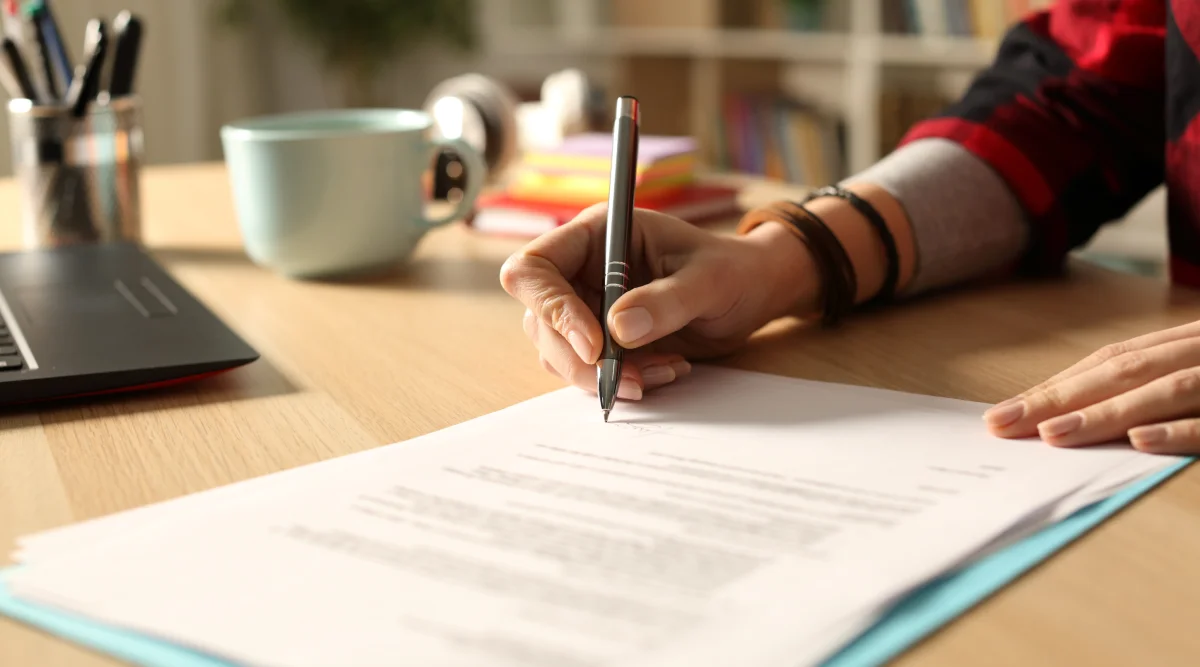When you create something original—like a book, song, photo, or design—you want to keep others from copying or using it without your permission. That’s what copyright is for. Whether you plan to sell your work or just want to protect it from misuse, knowing how long copyright protection lasts helps you understand your rights to your work. You might be wondering: How long do copyrights last? When does copyright expire? The answer is that it depends on who created the particular work and when.

Copyright duration for works published or created after Jan. 1, 1978
The Copyright Act of 1976 set the current rules for works created on or after Jan. 1, 1978: Generally, copyright protection lasts for the life of the author plus 70 years. The copyright duration is no different if the creator records a song, shoots a film, or throws a pot. Here’s a more specific breakdown for particular works under the Copyright Act.
- Single author: Life of the author plus 70 years
- Joint work (more than one author): Life of the last surviving author plus 70 years
- Anonymous or pseudonymous works and works-for-hire: 95 years from the year of first publication or 120 years from the year of creation, whichever comes first
Copyright protection exists the moment the word is on the screen, the musical note hits the page, or the image is in the camera’s memory. Unlike a patent, the creator does not need to register or file a particular work with the U.S. Copyright Office. An author has a book copyright, a composer copyrights the music they write, and a photographer owns their image copyrights as soon as the work is completed.
You can register a copyright with the U.S. Copyright Office, or your employer can register it for you. For example, if you’re paid to write an article, then federal copyright law will presume that your employer is also paying for your copyright. This is known as a work-for-hire, and the company that paid you to write the article also owns the copyright for that particular work.
This table gives a few hypothetical examples to help you better understand copyright protection for works created after Jan. 1, 1978.
| First Publication | Renewal Needed? | Copyright Expiration |
|---|---|---|
| 1930 | N/A | 2026 |
| 1935 | Yes | 1963 (if not renewed) 2030 (if renewed) |
| 1950 | Yes | 1978 (if not renewed) 2045 (if renewed) |
| 1965 | No | 2060 |
| 1985 | No | 2070 |
Copyright duration for works published before Jan. 1, 1978
For works published prior to Jan. 1, 1978, the copyright duration is generally 95 years from publication, but it depends on the publication date.
- Works published before 1930: These works are in the public domain.
- Works published between 1930 and 1963: Initially granted 28 years of copyright protection. If the copyright was then renewed, the protection extended for an additional 67 years, totaling 95 years. If not renewed, the work entered the public domain.
- Works published between 1964 and 1977: Automatically received 95 years of copyright protection from the date of publication, without the need for renewal.
The maximum copyright protection for all works published prior to 1978 is 95 years. This means that any copyright more than 95 years old expires, and those works go into the public domain. For example, on January 1, 2026, any works published prior to 1930 went into the public domain. (Those published before 1930 were already in the public domain.)
This table gives a few examples to help you better understand copyright protection for works published before January 1, 1978.
| Type of Work | Year Created | Author's Death | Copyright Duration | Copyright Expires |
|---|---|---|---|---|
| Single-artist painting | 1980 | 2030 | 2030 + 70 years | 2100 |
| Joint-authored screenplay | 2010 | Last author dies in 2050 | 2050 + 70 years | 2120 |
| Anonymous or pseudonymous work in a magazine | Published in 1995 | N/A | 1995 + 95 years | 2090 |
| Photographs taken for a business (work-for-hire) | Created in 2015, never published | N/A | 2015 + 120 years | 2135 |
Unpublished works created before 1978
What if you created something before 1978, but didn’t publish or register it? Unpublished works created before Jan. 1, 1978, are generally treated the same way as works created on or after that date.
- If the author is known: Unpublished works are protected for the life of the author plus 70 years.
- Anonymous or pseudonymous works and works-for-hire: Unpublished works are protected for 120 years from the date of creation or 95 years from the date of publication, whichever expires first.
For example, if you discover an unpublished manuscript written in 1950 by an author who died in 1980, the copyright will last until 2050.
Sound recording copyright laws
Sound recordings follow their own copyright law. Before Feb. 15, 1972, federal copyright law didn’t cover them—state laws did. The Music Modernization Act of 2018 changed that by bringing all sound recordings under federal copyright law, even the older ones. According to the Act:
- Sound recordings published before 1923 are always public domain.
- Sound recordings published between 1923 and 1946 are protected for 100 years from publication.
- Sound recordings published between 1947 and 1956 are protected for 110 years from publication.
- Sound recordings published between 1957 and Feb. 14, 1972, are protected until Feb. 15, 2067.
- Sound recordings made on or after Feb. 15, 1972, have the same copyright protection as other creative works: The life of the author plus 70 years or 95/120 years for anonymous and pseudonymous works or works made for hire.
What is the public domain?
When a work enters the public domain, it means no one owns the copyright anymore. You can use, copy, and share these works freely. A work enters the public domain when its copyright expires or if the owner gives up their rights. Public domain helps grow creativity by giving people access to older materials. For example, artists, businesses, and everyday people can reuse and remix older works without needing permission.
How to find out if a work is still copyrighted
The copyright protection of a work depends on the date of first publication or creation. Sometimes it's easy to figure out how long a copyright is good for:
- Anything more than 95 years old no longer has copyright protection and is public domain.
- Any sound recordings with a first publication more than 100 years ago are no longer protected and are public domain.
- For works published from 1964 through 1977, copyright is still in effect, as it lasts 95 years.
However, some publication dates will require a little more digging:
- Works published anywhere from 95 years ago through 1963 are copyrighted for 95 years only if the owner renewed their rights after 28 years. If they did not, the work entered public domain 28 years from first publication.
- Works created on or after Jan. 1, 1978, are copyrighted for the life of the author plus 70 years. This does not depend on the date of first publication—works do not have to be published to be copyrighted.
For many of these particular works, you can check the U.S. Copyright Office’s records to find out if it’s still copyrighted. Newer works may be more complicated because copyright protection starts upon creation, which can be more difficult to figure out, especially if the work isn’t registered with the Copyright Office. If you’re ever unsure of the answer to “How long does a copyright last?” a copyright lawyer can help you figure it out.
Protect your original works of authorship by registering a copyright. Copyright registration through LegalZoom is simple and affordable. Begin by answering a few questions. We'll work with you to assemble your application and file it with the U.S. Copyright Office.
FAQs
Can copyright be renewed or extended?
Regardless of who registers the copyright with the Copyright Office, you do not need to worry about copyright renewal. For a time in the last century, copyright holders had to file an application and pay a fee at about the halfway point of their copyright's duration. Failure to submit a renewal resulted in expiration of the copyright. Copyright laws are different now, and there is no need to renew a copyright.
What is the 35-year copyright rule?
The 35-year rule gives creators a chance to take back rights to a particular work that they gave to someone else. You can do this starting 35 years after signing a copyright transfer. This rule is part of U.S. copyright law’s termination rights, which are meant to help creators regain control of their work over time.
What is the 100-year copyright rule?
The 100-year copyright rule applies to sound recordings with a first publication between 1923 and 1946. These recordings have copyright protection for 100 years from publication under the Music Modernization Act. After that time, the recordings enter the public domain and can be used freely.
Does registering a copyright affect its duration?
No, registering your copyright with the U.S. Copyright Office doesn’t change how long it lasts. But registering a particular work with the Copyright Office does give you legal benefits, like the ability to sue for damages if someone copies your work. It also puts your claim on the record, which can help prove ownership if there’s ever a dispute.
Do different types of creative works have different copyright durations?
Yes, different types of works can have different rules. A book by a single author and a company-made video both have copyright protection, but the duration will differ. Sound recordings, anonymous and pseudonymous works, and works created for hire also follow different copyright law than works made by individuals. In addition, some copyright protection depends on the date of first publication, while other works are protected starting when they’re created.
Joe Runge, Esq. contributed to this article


